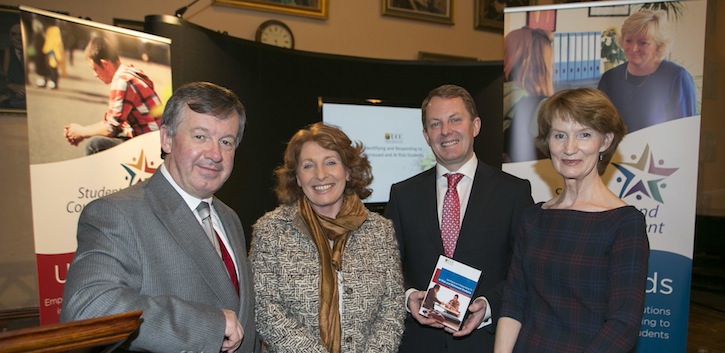2013 Press Releases
Mental health initiative to empower staff

What if a virtually untapped sector of frontline workers could be mobilised to protect the mental health of our young people, long before they ever present to traditional mental health services?
A new resource from UCC’s Student Counselling and Development service aimed at empowering staff in education settings and beyond may do just that. Minister of State for Disability, Equality, Mental Health and Older People Kathleen Lynch launched the unusual initiative, a bespoke DVD training tool called ‘Identifying and responding to distressed and at risk students’, on 16 December. Close to 100 people turned out for the launch in the Aula Maxima, composed of mental health professionals, students, staff and members of the public.
The catalyst to developing this mental health intervention, which is expected to be in high demand, originated from an urgent need to assist lay staff across the University to detect vulnerable students and communicate effectively with them. Whilst facilitating access for students who require mental health supports at a much earlier stage, the tool also comes into its own in terms of alleviating the anxiety and fear of staff that quite naturally may feel ill prepared to respond to a student in need.
Feedback on the pilot programme has convinced developers Marian Browne and Paul Moriarty (Head) of Student Counselling and Development at UCC that it's a resource that is transferable to other settings where distressed or at risk young people might be encountered.
“Students in need of professional support can be reluctant to seek it out. University staff who are in daily contact with students are very often the first to notice when something is amiss and can play a key role. In responding to students in this way, staff will largely be stepping outside of their typical role, so it is important that they receive specialised training which optimises the chances of students receiving the support they need,” said Marian Browne.
The UCC student counselling team has helped thousands of students overcome a variety of challenging circumstances.
“In keeping with reported trends in Irish third level institutions, UCC is experiencing increases in the numbers of students presenting for counselling. Over the past six years there has been a staggering 83% increase in demand. Students are presenting with mental health issues that are much more severe and complex than were previously encountered. The top three presenting issues for us are anxiety, academic (troubles) and depression. In the past year 11% of students who attended SCD were in the at-risk category”, Browne continued.
Recent findings from the ‘My World Survey’, released by Headstrong (NCYMH) and UCD in May 2012 therefore came as little surprise to those in counselling circles in Ireland. Being the first national study of youth mental health in Ireland, it gives perhaps the most accurate picture to date of what it is like to be a young adult in college today. Whilst heartening to learn that over half (53%) of students reported that they cope well with problems, some 40% were found to experience elevated levels of depression and anxiety, 21% revealed that they had self-harmed, while 7% attempted to take their own life, but only 3% sought support afterward. The survey recommended the presence of ‘One Good Adult’ and early interventions as crucial to support mental well being in students - the absence of which can be detrimental, leading to higher levels of distress and increased risk for suicide.
“The programme draws on many of these recommendations”, said Paul Moriarty. “The fact that 75% of mental health disorders manifest between the ages of 15-24 highlights the need for adequate student support services in the third level sector.”
The DVDs, suitable for use as part of in-depth training seminars or as a standalone resource, do not shy away from the issue of suicide. Indeed, one segment dealing with common myths around the topic advises viewers not to be afraid of asking a question often wrongly assumed to be loaded – “Are you thinking of taking your own life?”
The DVDs complement each other - one deals with identifying and responding to students in distress, such as those experience anxiety or depression, the other addresses the dire scenario of the ‘at risk’ student, who may be in immediate danger. Both clearly map out how to identify and communicate with such students, what to do and what not to do and teach the viewer how to navigate the referral process and legal landscape to ensure they reach relevant support services. It achieves this whilst ensuring professional boundaries are respected, such as ensuring the line between staff member and counsellor does not become blurred.
The resource is now available to purchase from the UCC Visitors’ Centre or via the UCC Shop (https://uccshop.ie/). Trailers of the DVDs can be viewed on the Student Counselling and Development website at www.ucc.ie/studentcounselling
